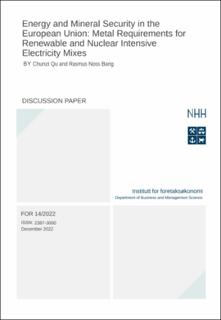Energy and Mineral Security in the European Union: Metal Requirements for Renewable and Nuclear Intensive Electricity Mixes
Working paper

Åpne
Permanent lenke
https://hdl.handle.net/11250/3039625Utgivelsesdato
2022-12-28Metadata
Vis full innførselSamlinger
- Discussion papers (FOR) [566]
Sammendrag
In 2022, the EU finds itself in the midst of an energy crisis due to the outbreak of the war between Russia and Ukraine and has to accelerate its path to energy independence. Part of the EU’s strategy is to double down on the transition to a renewable-intensive energy system. However, this has raised concerns about whether the EU risks swapping one type of energy dependence for another, namely fuel import dependence for metal import dependence. This paper investigates to what extent the EU would rely on metal imports if it is to execute its current energy plan, and whether a nuclear-intensive electricity production system could be a better option. When compared to today’s electricity mix, we find that a renewable-intensive electricity mix will increase the overall energy security in the EU – the reduction in fuel import dependence more than compensates for the increase in metal import dependence. However, we also find that a nuclear-intensive electricity mix can increase the overall energy security in the EU even further. When compared to a renewable-intensive electricity mix, a nuclear-intensive mix does not only have lower metal import requirements in terms of volume and value, but also reduces risk of bottleneck problems related to rare earths and silicone. Still, even with a nuclear-intensive energy mix, the EU will still rely on metal imports, and face potential bottleneck risks in terms of chromium.
Utgiver
FORSerie
Discussion paper;14/22Beslektede innførsler
Viser innførsler beslektet ved tittel, forfatter og emneord.
-
Precautionary Storage in Electricity Markets
Durmaz, Tunç (Discussion paper;5/16, Working paper, 2016-02-25)As renewable energy depends on meteorological shocks and is non-controllable, the overall energy production becomes riskier with the rising renewable share. Although this has led to a renewed interest in storage technologies, ... -
Energy storage and renewable energy
Durmaz, Tunç (Discussion paper;18/2014, Working paper, 2014-05)I consider an economy with fossil fuel and renewable energy and energy storage, and search for the conditions that lead to welfare improvements when energy is stored. I then solve for the optimal decision rule and analyze ... -
Comparative Investment Analysis of Wind and Nuclear Energy: Assessing the Impact of Changes in the Electricity Mix and Required Government Support for Investment Parity
Qu, Chunzi; Bang, Rasmus Noss (Discussion paper;8/23, Working paper, 2023-06-28)Nuclear energy is once again in the spotlight in Europe, due to recent technological advancements and geopolitical challenges. Our study presents an investment analysis framework that compares the prospects of onshore and ...